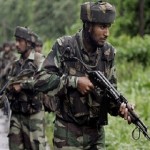When the act itself is the message, why diminish the impact by incendiary triumphalism? But the prime minister’s men with their adolescent fervor to brag about their “score” have been doing just that recently, giving India’s critics a handle to skewer New Delhi.
The Pakistani establishment is making full use of every inflammatory statement coming from Indian leaders. Western reporters who blithely equate the complex history of India and Pakistan in set paragraphs written for kindergartners are also jumping in – and seeing Islamabad as the victim.
This is how you pull defeat from the jaws of victory.
What could have been a quiet, covert operation against Northeastern insurgents, who ambushed an Indian army convoy last week killing 18 soldiers, has turned into a public relations disaster. Intention and deterrence were both contained in the act itself–the medium was the message.
Instead, every rule in the book was violated because Prime Minister Narendra Modi’s men can’t contain themselves. The strutting is embarrassing and a depressing indicator of maturity levels.
The operation was covert but before its impact could be assessed, even the most minor details were leaked. Prominent journalists on Twitter were debating the exact time the operation started and how deep it went.
While the spin machine was in overdrive, it put the Myanmar government in a no-win position. How could it admit in public it allowed foreign troops to come in? Of course, it denied any penetration of its territory, prompting a prominent Pakistani commentator to declare that India was caught “lying.”
He and others exploited the opening, choosing to forget that Pakistan’s military has cooperated with the US on drone strikes against terrorists while complaining about violation of sovereignty and whipping up anti-American hysteria in public.
The Twitter machismo displayed by junior information minister Rajyavardhan Singh Rathore shortly after the operation may have appealed to the BJP constituency but it was unappealing to India’s friends watching from afar. India’s security establishment already has a reputation in Washington of “talking too much” and now it is matched by politicians who come with a side order of chest-thumping.
Strutting about the cross-border operation, it turns out, may have been premature at the most basic level. The operation appears to have culled fewer insurgents than boldly stated before – seven, according to the Indian Express and not between 20 and 100 as previously reported.
To add to the embarrassment, Rathore’s eager brags that the Indian army had gone deep inside Myanmar, managed to upset the neighbor enough that an official decided to go on the record. This in diplomatic terms, is a slap.
Zaw Htay, director in the Myanmar president’s office, told The Telegraph from Nay Pyi Taw, “We will not allow any foreign military operations in Myanmar territory.” He added for good measure: “Every country must respect the other country’s sovereignty.”
This should be a crisp lesson on how not to embarrass a friendly government and jeopardize future cooperation. The desire to turn a relatively modest operation into political gain can backfire.
It is time to end the low-level “mohalla” rhetoric and “tana-bazi” – it is uncouth, unseemly and damaging for India’s image. Over the last month, irresponsible statements from various ministers have come thick and fast, giving India’s enemies the public relations advantage.
No surprise that Pakistan’s military establishment and civilian leaders have turned up the heat, turning in the knife on a daily basis. Gen. Raheel Sharif is believed to have “instructed” the Pakistani civilian leadership to keep up the blame-game against India and RAW for attacks against the Baloch and Shia.
Pakistan’s rapid fire began in May after Indian defence minister Manohar Parrikar talked of neutralizing “terrorists with terrorists.” And then he went on to joke, crassly, about how his statement made Pakistan see red (“mirchi lag gaye”).
Maybe it is hard for BJP ministers to measure the “moral advantage” India has logged over time as Pakistan’s use of terrorists as an instrument of state policy has slowly but surely been exposed. To hand it over because a minister couldn’t resist a one-liner shows his innocence about the real public relations battles that are long and hard. They are not fought on prime time.
Communication and messaging must be strategic and even subtle at times. The hammer approach is good in Bollywood, not in the real world.
Seema Sirohi is a Washington-based analyst and a frequent contributor to Gateway House: Indian Council on Global Relations. Seema is also on Twitter, and her handle is @seemasirohi
This article was exclusively written for Gateway House: Indian Council on Global Relations. You can read more exclusive content here.
For interview requests with the author, or for permission to republish, please contact outreach@gatewayhouse.in.
© Copyright 2015 Gateway House: Indian Council on Global Relations. All rights reserved. Any unauthorized copying or reproduction is strictly prohibited


